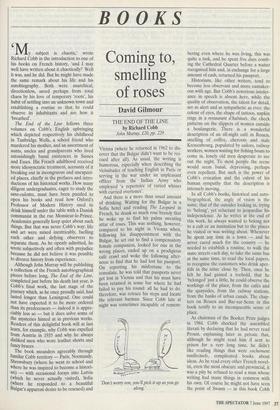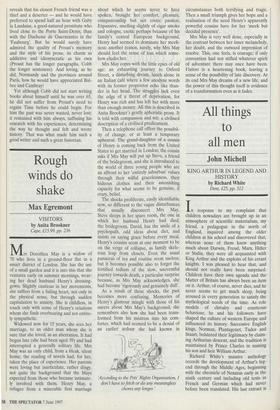BOOKS
Coming to, smelling of roses
David Gilmour
THE END OF THE LINE by Richard Cobb John Murray, £20, pp. 229 My subject is chaotic,' wrote Richard Cobb in the introduction to one of his books on French history, 'and I may well have written about it chaotically!' Well it was, and he did. But he might have made the same remark about his life and his autobiography. Both were anarchical, directionless, saved perhaps from total chaos by his love of temporary 'roots', his habit of settling into an unknown town and establishing a routine so that he could observe its inhabitants and see how it 'breathed'.
The End of the Line follows three volumes on Cobb's English upbringing which depicted respectively his childhood in Tunbridge Wells, a school friend who murdered his mother, and an assortment of aunts, uncles and grandparents who lived astonishingly banal existences in Sussex and Essex. His French adulthood received more idiosyncratic treatment, accounts of it breaking out in incongruous and unexpect- ed places, chiefly in the prefaces and intro- ductions of his historical works. How many diligent undergraduates, eager to study the sans-culottes, must have been puzzled to open his books and read how Oxford's Professor of Modern History used to drink himself under the table with a Danish communist in the rue Monsieur-le-Prince. Academics generally keep quiet about such things. But that was never Cobb's way: life and art were mixed inextricably, fuelling each other and defying observers to separate them. As he openly admitted, he wrote subjectively and often with prejudice because he did not believe it was possible to divorce history from experience.
Although John Murray will be publishing a collection of the French autobiographical pieces before long, The End of the Line, completed just before his death last year, is Cobb's final work, the last stage of the Journey which, as he once proudly said, had lasted longer than Leningrad. One could not have expected it to be more ordered than its predecessors — indeed it is appre- ciably less so — but it does solve some of the mysteries hinted at in previous works. Readers of this delightful book will at last learn, for example, why Cobb was expelled from Austria in 1935 and why he always disliked men who wore leather shorts and fancy braces.
The book meanders agreeably through familar Cobb territory — Paris, Normandy, Shrewsbury (where he went to school and Where he was inspired to become a histori- an) — with occasional forays into Latvia (which he never actually visited), Sofia (where he responded to a beautiful Bulgar's apparent desire to be rescued) and Vienna (where he returned in 1962 to dis- cover that the Bulgar didn't want to be res- cued after all). As usual, the writing is humorous, especially when describing the vicissitudes of teaching English in Paris or serving in the war under an unpleasant officer from the Indian Army who employed 'a repertoire of varied whines with curried overtones'.
And there is a more than usual amount of drinking. Waiting for the Bulgar in a Sofia hotel and reading The Leopard in French, he drank so much rose brandy that he woke up to find his palms sweating attar of roses. This was nothing, however, compared to his night in Vienna when, following his disappointment with the Bulgar, he set out to find a compensatory female companion, looked for one in the wrong places, ended up on a prodigious café crawl and woke the following after- noon to find that he had lost his passport. On reporting his misfortune to the consulate, he was told that passports never get lost in Vienna and that his must have been retained in some bar where he had failed to pay his round: all he had to do, therefore, was retrace his steps and locate the relevant barman. Since Cobb late at night was sometimes incapable of remem- 'Don't wony son, you'll pick it up as you go along.' bering even where he was living, this was quite a task, and he spent five days comb- ing the Cathedral Quarter before a waiter recognised him and, in exchange for a large amount of cash, returned his passport. Historians, like other writers, tend to become less observant and more cantaker- ous with age. But Cobb's notorious intoler- ance in speech is absent here, while the quality of observation, the talent for detail, are as alert and as sympathetic as ever: the colour of eyes, the shape of tattoos, napkin rings in a restaurant d'habitues, the check patterns on the slippers of women outside a boulangerie. There is a wonderful description of an all-night café in Rouen, smelling of coffee, cheroots and stale Kronenbourg, populated by sailors, railway workers, women waiting for fishing boats to come in, lonely old men desperate to see out the night. To most people the scene would seem banal, depressing, perhaps even repellent. But such is the power of Cobb's evocation and the extent of his human sympathy that the description is intensely moving.
In all Cobb's books, historical and auto- biographical, the angle of vision is the same, that of the outsider looking in, trying to 'belong', yet reluctant to jeopardise his independence. As he writes at the end of this work, he always wanted to belong not to a cult or an institution but to the places he visited or was writing about. Whenever he spent any time in a town — and he never cared much for the country — he needed to establish a routine, to walk the same streets each day, to take the same bus at the same time, to read the local papers, to recognise the customers who drink aper- itifs in the tabac close by. Then, once he felt he had gained a toehold, that he 'belonged' just a little, he could observe the workings of the place, from the cafés and the quaysides, from the railway stations, from the banks of urban canals. The chap- ters on Rouen and Bar-sur-Seine in this book testify to an incomparable sense of place.
As chairman of the Booker Prize judges in 1984, Cobb shocked the assembled literati by declaring that he had never read Proust, explaining later in private that, although he might read him if sent to prison for a very long time, he didn't like reading things that were vachement intellectuels, complicated books about ideas. As he read every other French novel- ist, even the most obscure and provincial, it was a pity he refused to read a man whose writing had many things in common with his own. Of course he might not have seen the point of Swann — in this book Cobb reveals that his closest French friend was a thief and a deserter — and he would have preferred to spend half an hour with Gaby la Landaise, a good-natured prostitute who lived close to the Porte Saint-Denis, than with the Duchesse de Guermantes in the 'Faubourg'. But he would surely have admired the quality of Proust's memory and the style of his prose, its charm as addictive and idiosyncratic as his own (Proust has the longer paragraphs, Cobb the longer sentences). And loving, as he did, Normandy and the provinces around Paris, how he would have appreciated Bal- bec and Cambray!
Yet although Cobb did not start writing books about himself until he was over 65, he did not suffer from Proust's need to regain Time before he could begin. For him the past was never wasted, never lost; it remained with him always, suffusing his research with his experiences, determining the way he thought and felt and wrote history. That was what made him such a good writer and such a great historian.











































































 Previous page
Previous page